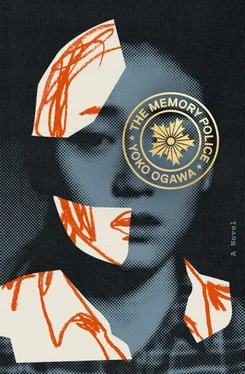“My father died five years ago,” I said as slowly and evenly as I could, trying to remain calm.
“We know,” said another man, wearing insignia shaped like a wedge, a hexagon, and the letter “T.” As though his words had been some sort of signal, the five officers marched into the house without even removing their shoes. Suddenly, the corridor was filled with the clatter of boots and guns.
“I’ve just cleaned the carpets,” I said. “Please take off your shoes.” I knew I should have said something more forceful, but this simple request was all that came to mind. It hardly mattered, since they paid no attention to me and were already climbing the stairs.
They seemed to know exactly where they were going, and a moment later they were in my father’s office on the east side of the house, setting to work with remarkable efficiency. First, one of them opened all the windows, which had been sealed shut since my father’s death. Meanwhile, another one used a long, thin tool like a scalpel to force the locks on the cabinets and the desk drawers. The rest ran their fingers over every inch of the walls, apparently in search of secret compartments.
Then they all began to riffle through my father’s papers, pawing at his notes, drafts, books, and photographs. When they came upon something they considered dangerous—in other words, anything that contained the word “bird”—they threw the item unceremoniously on the floor. Leaning against the doorframe, I fiddled nervously with the lock as I watched them work.
The Memory Police, just as I’d heard, went about their assigned tasks in the most efficient manner. They worked in silence, their eyes fixed, making no unnecessary movements. The only sound was the rustling of papers, like the fluttering of wings.
In no time at all, a mountain of paper had formed on the floor. Nearly everything in the room had to do with my father’s work in some way. Documents covered with my father’s familiar handwriting and the photographs he had taken at the observatory flew out of the officers’ hands one after the other. There was no doubt that they were creating chaos, but they went about it in such a precise manner that they gave an impression of careful order. I felt I should try to stop them, but my heart was pounding and I didn’t know what to do.
“Please be careful,” I murmured, but they ignored me. “These are the only things I have from my father.” Not one of them so much as turned to look at me, and my voice was lost in the pile of memories on the floor.
Then one of the officers reached for the handle on the bottom drawer of the desk.
“There’s nothing in there that has to do with birds,” I cried out. It was the drawer where my father kept family letters and photographs. The officer—this one wore a badge made up of concentric circles, as well as one shaped like a rectangle and another like a teardrop—continued his search. The only offending item in the drawer was a photograph of our family with a brightly colored rare bird—I no longer recall the name—that my father had managed to hatch from an egg he had incubated. The man carefully gathered up the remaining photographs and letters and put them back in the drawer. That was the only kindness shown that day.
When they had finished sorting through everything, they took the items piled on the floor and shoved them into large black plastic bags they pulled from pockets inside their jackets. It was clear from the brutal way they stuffed the bags that they were going to dispose of everything they took. They had not been looking for anything in particular; they had simply wanted to eliminate all trace of anything relating to birds. The first duty of the Memory Police was to enforce the disappearances.
I realized at some point that this search was unlike the day they took my mother away. Today, they seemed to have found everything they wanted, and I was fairly sure they would not be back. My father was dead, and the memory of the birds was gradually fading from the house.
The search had taken an hour and had yielded ten large bags. The office had grown quite warm from the bright sun that streamed in. The polished badges shone on the officers’ collars, but none of the men appeared to be sweating or suffering from the heat in any way. They shouldered two bags each and carried them to the truck they had left parked outside.
The room had changed completely. The traces of my father’s presence, which I had done my best to preserve, had vanished, replaced by an emptiness that would not be filled. I stood in the middle of that emptiness, feeling myself on the verge of being drawn into its terrible depth.
Chapter 3

I make my living now from my writing. So far, I’ve published three novels. The first was about a piano tuner who wanders through music shops and concert halls searching for her lover, a pianist, who has vanished. She relies solely on the sound of his music that lingers in her ears. The second was about a ballerina who lost her right leg in an accident and lives in a greenhouse with her boyfriend, who is a botanist. And the third was about a young woman nursing her younger brother, who suffers from a disease that is destroying his chromosomes.
Each one told the story of something that had been disappeared. Everyone likes that sort of thing. But here on the island, writing novels is one of the least impressive, most underappreciated occupations one can pursue. No one could claim that the island is overflowing with books. The library, a shabby single-floor wooden building next to the rose garden, has only a handful of patrons, no matter when one visits, and the books seem to cower on the shelves, fearful of crumbling to dust at the slightest touch. They will all, in the end, be tossed out without being cared for or rebound—which is why the collection never grows. But no one ever complains.
The bookstores are much the same. Nearly deserted, and the managers appear almost surly behind their stacks of unsold books with yellowing covers.
Few people here have any need for novels.
I generally begin writing at about two o’clock in the afternoon and keep at it until nearly midnight, yet I rarely finish more than five pages. I enjoy writing slowly, filling each square on the paper, one character at a time. There’s no need to hurry. I take my time.
I work in my father’s old room. But it’s much neater and more orderly now, since my novels require no notes or other materials. My desk holds only a stack of paper, a pencil, a small knife to sharpen it, and an eraser. Though I’ve tried, I’ve found no way to fill in the voids left by the Memory Police.
When evening comes, I go out to walk for an hour or so. I follow the coastal road to the dock, and on the way home I take a path over the hill that passes the observatory.
The ferry has been tied to the dock for a very long time and is now completely covered with rust. No passengers board it and it can no longer take them anywhere. It, too, is among the things that have been disappeared from the island.
The name of the boat is painted on the bow, but the salt air has scoured it away, leaving it illegible. The windows are coated with dust, and the hull and anchor chain and propeller are covered with mussels and seaweed—as though it is an enormous sea creature that is slowly turning to stone.
My nurse’s husband had once served as mechanic on the boat. After the ferry had disappeared, he worked as a watchman for a warehouse by the docks. But at some point he retired and he lives now on the abandoned boat. On my walk, I invariably stopped in to chat with him.
“How have you been?” he asked one evening, offering me a chair. “Are you making progress with your novel?” There are lots of places to sit, so depending on the weather or our mood we might find ourselves occupying a bench up on deck or relaxing on a comfortable couch in the first-class lounge.
Читать дальше













